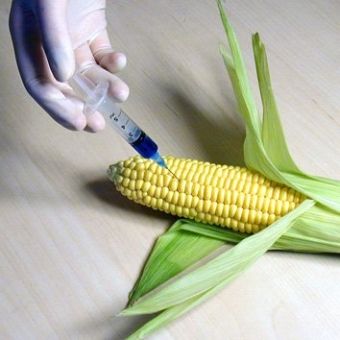GM Food and the Brink of No Return
April Scott Salem-News.com
Monsanto's patented genes are inserted into roughly 95 percent of soybeans and 80 percent of corn crops grown in the US.
 Genetically modified food
Genetically modified food Courtesy: thrivinglifestyle.com
(SALEM, Ore.) - The United States Supreme Court will hear arguments in April, for the first time, about the safety of genetically engineered (GE) crops and their potential for contamination of nearby conventional crops in Geertson Seed Farms V. USDA and Monsanto[1].
Owner of Geertson Seed Farms, Idaho farmer Phil Geertson is the lead plaintiff in the case. The 2006 lawsuit was filed by the Center for Food Safety on behalf of Geertson and other farmers who worry about GE crop contamination of their conventionally grown alfalfa.
Only now are millions of Americans waking up to the fact that an estimated seventy-five percent of our processed foods contain some form of genetically modified (GM) ingredients according to the Center for Food Safety.
Many consumers don’t understand the process used to develop these GM foods that have been deemed “substantially equivalent” to other foods by executive order, and therefore bypassed with little regulation to the public without their knowledge or consent.
The process behind genetically modified food involves a careful re-configuration of genes combining e-coli bacteria, soil bacteria and the cauliflower mosaic virus that causes tumors in plants. They add an antibiotic and then artificially force it into plant cells with a gene invasion technique. (Watch the process below)[2]. All this is so farmers can douse nearly unlimited amounts of Roundup Herbicide on the crops and the plants won’t die.
They don’t even know how their practices will affect the environment. Out of eight hundred reviewed GE food applications submitted to the USDA, no environmental impact statements (EIS) were conducted. USDA just released a draft of its first EIS on December 14, 2009. A 60-day comment period is open until March 3, 2010. Their final decision will have broad implications for all GE crops[3]....
(excerpt) In January 2010, The U.S. Department of Justice began investigating charges against Monsanto for violations of anti-trust and monopoly laws stemming from their GE Soybean product. Public hearings will be held this spring. Justice Department spokeswoman Gina Talamona confirmed antitrust regulators have begun a formal investigation of the seed industry.
Several million acres of GE soybeans and cotton are purportedly now infested with glyphosate-resistant and tolerant weeds. Glyphosate is the active ingredient in Roundup, which by design destroys all pests and invasive plants that come in contact with the crop. According to data from the U.S. Department of Agriculture (USDA), the number of glyphosate applications by farmers has risen considerably[5]. It is shown that the more resistant the weeds become to the herbicide, the more chemicals the farmers will have to apply to crops to get the same effects.
(excerpt) What has science revealed about the health effects in animals?
Genetic Modification expert Arpad Pusztai of
Scotland Rowett Research Institute. BBC photo
Believing in the potential of GM foods, UC Berkeley's Ignacio Chapela and Arpad Pusztai, a plant genetic modification expert from Scotland Rowett Research Institute, were fired after they were commissioned to conduct the first independent study of GM foods.
Arpad Pusztai and other scientists were shocked at their results of animals fed GM foods. Other independent studies showed stunted growth, impaired immune systems, bleeding stomachs, abnormal and potentially pre-cancerous cell growth in the intestines, impaired blood cell development, misshaped cell structures in the liver, pancreas and testicles, altered gene expression and cell metabolism, liver and kidney lesions, partially atrophied livers, inflamed kidneys, less developed organs, reduced digestive enzymes, higher blood sugar, inflamed lung tissue, increased death rates and higher offspring mortality as well[6].
Rob Edwards, Environment editor of Scotland’s Sunday Herald wrote of another study “genetically modified (GM) food could give you cancer. That is the stark warning today from one of Scotland's leading experts in tissue diseases.” “Dr Stanley Ewen, a consultant histopathologist at Aberdeen Royal Infirmary, says that a cauliflower [mosaic] virus used in GM foods could increase the risk of stomach and colon cancers.”
http://www.salem-news.com/articles/march012010/monsanto_as.php
No comments:
Post a Comment